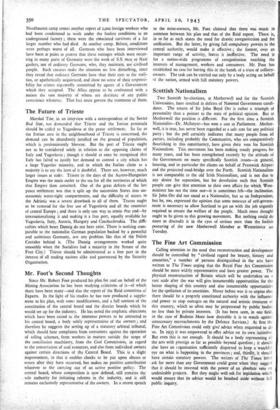The Future of Trieste
Marshal Tito, in an interview with a correspondent of the Soviet Red Star, nas demanded that Trieste and the Istrian peninsula should be ceded to Yugoslavia at the peace settlement. So far as the Istrian area in the neighbourhood of Trieste is concerned, the demand can be abundantly justified on the ground of population, which is predominantly Slovene. But the port of Trieste ought not to be considered solely in relation to the opposing claims of Italy and Yugoslavia ; though it should at once be recognised that Italy has failed to justify her demand to control a city which has a large Yugoslav minority, and in which the Italian claim to a majority is to say the least of it doubtful. There are, however, much larger issues at stake. Trieste in the days of the Austro-Hungarian Empire was the main outlet to the sea for all the territories of which that Empire then consisted. One of the great defects of the last peace settlement was that it split up the succession States into un- economic water-tight compartments, and the difficulty of access to the Adriatic was a severe drawback to all of them. Trieste ought to be restored for the free use of Yugoslavia and all the countries of central Europe ; and there is only one way to attain that end—by internationalising it and making it a free port, equally available for -Yugoslavia, Italy, Austria, Hungary and Czechoslovakia. The diffi- culties which beset Danzig do not here exist. There is nothing com- parable to the nationalist German population backed by a powerful and ambitious Germany, nor any problem like that of the Polish Corridor behind it. (The Danzig arrangements worked quite smoothly when the Socialists had a majority in .the Senate of the Free City.) Trieste should be administered as a free port in the interest of all trading nations alike and guaranteed by the Security Organisation.


























 Previous page
Previous page